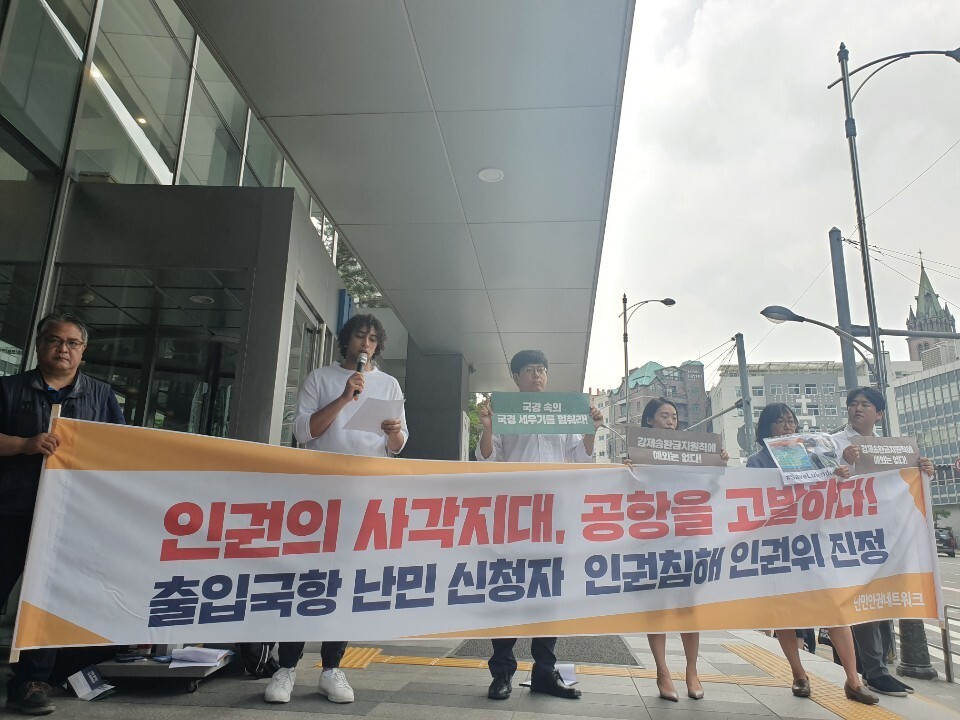hankyoreh
Links to other country sites 다른 나라 사이트 링크
Refugee applicants abused and harassed by airport authorities

Egyptian Mohamed Abozeed, 23, shakes his head as he recalls how he was trapped in Incheon Airport in April 2018. Incheon Airport, his entry point into South Korea, was a place of “severe stress and psychological pressure” for Abozeed. The man had seen fellow demonstrators in the January 25 Revolution in Egypt in 2011 being arrested and killed. He’d hidden out in a university in Cairo after a military tribunal sentenced him to life in prison.
After arriving at Incheon Airport on Apr. 17, 2018, Abozeed applied for refugee status, but South Korea’s immigration authorities decided not to pass along his application for review, informing him that they’d learned from the Egyptian embassy that his documents had been falsified. During the 20 days it took for immigration to reverse its decision, Abozeed had to wander around the Incheon Airport concourse. “I was constantly cold and in pain, spending day after day in sadness. I didn’t have any food or a place to sleep, but the airport employees kept pushing me to get ready to board, which caused psychological stress,” he said.
On June 20, which is designated by the UN as World Refugee Day, the Korea Refugee Rights Network held a press conference in front of the National Human Rights Commission of Korea. “Since a system was put in place to enable asylum-seekers to apply for asylum at airports and other ports of entry in July 2013, acts of violence and human rights violations have been occurring at airports,” the network said. The number of people who have applied for refugee status at ports of entry such as Incheon Airport and Gimhae Airport has more than doubled, from 197 in 2017 to 516 last year, but only 46.7% of them have had their applications referred for review. When the authorities refuse to review an asylum-seeker’s application, the asylum-seeker is returned to their home country.
Such asylum-seekers “suffer violence during the repatriation process,” according to Ma Han-eol, an attorney with a law firm called Duroo, who has interviewed asylum-seekers at airports. “They’re shot with gas pistols and put in handcuffs before being hauled onto a plane like luggage. In July 2018, there was one asylum-seeker who’d been hit by a baton. As the asylum-seeker cried and begged not to be beaten, the perpetrator looked on with a sneer on his face.”
“Despite a ruling by the Constitutional Court that asylum-seekers who are detained after arriving at the airport must be guaranteed the right to an attorney, they don’t actually get to see one,” said Lee Il, an attorney with Advocates for Public Interest Law (APIL).
On World Refugee Day, Choi Young-ae, chair of the National Human Rights Commission, released a statement calling for the improvement of the treatment of refugees. “Even though the current Refugee Act states that refugees must receive the same social security as South Korean citizens, we have found numerous examples of the restrictions on foreigners that appear in laws or guidelines about social security being applied without exception to people with refugee status as well,” Choi said in the statement.
By Kwon Ji-dam, staff reporter
Please direct comments or questions to [english@hani.co.kr]

Editorial・opinion
![[Column] Welcome to the president’s pity party [Column] Welcome to the president’s pity party](https://flexible.img.hani.co.kr/flexible/normal/500/300/imgdb/original/2024/0515/3917157400447943.jpg) [Column] Welcome to the president’s pity party
[Column] Welcome to the president’s pity party![[Editorial] Korea must respond firmly to Japan’s attempt to usurp Line [Editorial] Korea must respond firmly to Japan’s attempt to usurp Line](https://flexible.img.hani.co.kr/flexible/normal/500/300/imgdb/original/2024/0514/2317156736305813.jpg) [Editorial] Korea must respond firmly to Japan’s attempt to usurp Line
[Editorial] Korea must respond firmly to Japan’s attempt to usurp Line- [Editorial] Transfers of prosecutors investigating Korea’s first lady send chilling message
- [Column] Will Seoul’s ties with Moscow really recover on their own?
- [Column] Samsung’s ‘lost decade’ and Lee Jae-yong’s mismatched chopsticks
- [Correspondent’s column] The real reason the US is worried about Chinese ‘overcapacity’
- [Editorial] Yoon’s gesture at communication only highlights his reluctance to change
- [Editorial] Perilous stakes of Trump’s rhetoric around US troop pullout from Korea
- [Guest essay] Preventing Korean Peninsula from becoming front line of new cold war
- [Column] The state is back — but is it in business?
Most viewed articles
- 1[Column] Welcome to the president’s pity party
- 2[Editorial] Korea must respond firmly to Japan’s attempt to usurp Line
- 3Korea cedes No. 1 spot in overall shipbuilding competitiveness to China
- 4Could Korea’s Naver lose control of Line to Japan?
- 5[Editorial] Transfers of prosecutors investigating Korea’s first lady send chilling message
- 6[Column] Will Seoul’s ties with Moscow really recover on their own?
- 7US has always pulled troops from Korea unilaterally — is Yoon prepared for it to happen again?
- 8Second suspect nabbed for gruesome murder of Korean in Thailand, 1 remains at large
- 9Korean auto industry on edge after US hints at ban on Chinese tech in connected cars
- 10Major personnel shuffle reassigns prosecutors leading investigations into Korea’s first lady